Статьи. Рубрика в журнале - Schole. Философское антиковедение и классическая традиция
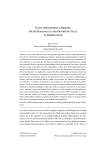
Plato’s Philosophical Mimesis: On the Pedagogical and Protreptic Value of Imperfection
Статья научная
This article addresses two often perplexing traits in Plato’s philosophical style: first, the fact that Plato’s writings are mimetic, despite the strong criticisms of mimesis we find therein; second, the fact that this mimesis not only features the constitutive defects inherent to any mimesis, but Plato actually increases its imperfection by adding other manifest defects. Based on epistemological and psychological views taken from the Platonic corpus (especially the soul’s tripartition), I show how Plato’s philosophical mimesis uses defectiveness or imperfection to overcome the limitations of mimesis identified in the Republic. To explain this, I argue that Plato’s philosophical mimesis should be primarily conceived as an imitation of people or conversations in which views or arguments are conveyed, but rather as an imitation of the act or practice of philosophical inquiry, and that by rendering this act visible to the reader, the Platonic corpus can better teach how to perform it and better turn readers to a life determined by its performance. This is not without risks because, as a type of mimesis, philosophical mimesis can still lead to misunderstandings or affect the soul in a negative way. However, the quantitative, qualitative and tonal defects Plato introduces in his mimesis of philosophical inquiry cause astonishment and therefore have a provocative effect that helps to reduce those risks and enhance the corpus’ pedagogic and protreptic potential. Consequently, Plato’s philosophical mimesis explores the benefits of mimesis and is in strong contrast with artistic or dramatic mimesis as is understood in Republic X.
Бесплатно
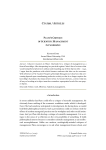
Plato’s critique of scientific management in Charmides
Статья научная
I discover resources in Plato’s Charmides for a critique of management as a form of knowledge. After interpreting in a practical register Critias’ idea of a science that would comprehend all sciences without understanding any of their objects (166c - 175a), I argue that the paradoxes with which Socrates confronts this idea can be overcome. With reference to F.W. Taylor’s Principles of Scientific Management , I show how this overcoming depends upon transforming productive activity so that it no longer requires the knowledge of products that characterizes techne . As Socrates foresaw, a science that has all ways of working as its object must have somehow expropriated work of its own proper objects.
Бесплатно
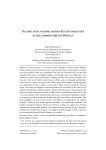
Playing and laughing gods of Plato's dialogues in the commentaries of Proclus
Статья научная
“Socrates’ irony” is a well-known topos even for those readers who are far from ancient philosophy. Dialogues of Plato contain different modes of humour, from mild self-irony to quite sarcastic tones. Plato’s gods are ‘playful,’ they treat people as those were ‘playthings.’ The best way of mortals’ life is to play also, spending their time in “sacrificing, singing, and dancing.” However, Neoplatonic commentaries to Plato tend to avoid explicit laughter and any direct mode of humour. Proclus Lycaeus, one of the most fruitful commentators of Plato, seems to disregard anything ludicrous in Plato’s writing. The places, where Plato speaks about laughter or playing games, are explained by Proclus as signs to some kind of divine activity towards the material realm. Even smile and laughter of particular humans are interpreted in the same way as symbols ( synthēmata ) of gods’ providence. What Proclus discusses in minor details, is the dialectics of gods’ procession into the sensible world, causing substantiation of the universe, and retention of the internal bonds that keep it eternal and unchangeable. Similarly, temporary particular beings also benefit from divine providence, which fortifies their vital capabilities. In general, these forms of providence are depicted by “the undying laughter” of gods. In spite of this approach seeming to be superfluously ‘scholastic’ and therefore losing the dramatic perspective of Plato’s writings, we suggest that Proclean interpretation may assume laughter to be related to some theurgic practice. Therefore, reading and interpretation the game- and laughter-related passages of Plato could have been considered themself a kind of theurgic “sacred play.”
Бесплатно
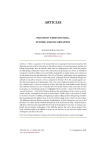
Plotinus views on soul, suicide, and incarnation
Статья научная
The questions that need to be answered, if we want to understand the role of suicide and its connection with the soul, incarnation, murder of man and living beings in the Universe of Plotinus, are as follows: To what extent should the body be considered an outer shell? Is purification the goal of the incarnation of the soul? Is it not the case that through the incarnation in the individual soul new, previously hidden possibilities are actualized, or is the body only a tool for punishing the soul and its alienation? Our ideas about Plotinus philosophy essentially depend on how we solve this riddle. And although, as the comparison of Ennead 1.4.46 and 1.9.16 shows, Plotin changed his attitude toward suicide as he age, this concept arises in his philosophy in several basic contexts. First of all, in the traditional sense for the present, he asks about whether the soul should, if it is given free choice, leave the body or stay in it? In addition, Plotinus enriches our concept of suicide with two additional meanings. Secondly, he considers self-incarnation to be suicide, illustrating this idea with the myths about the infant Dionysus and Narcisse: the incarnation is presented here as an involuntary suicide, the result of the irrational desire of the soul for matter. Secondly, suicide should be considered the killing or destruction of another living being or plant, because in this case we destroy a particle of a single soul, which are themselves involved. Unlike Plotinus, the late Neoplatonists, such as Damascus, insisted on the impossibility of a complete separation of the soul from the case as long as the body is alive, which made it impossible for the soul of the potential sage to completely immerse himself in the positive nothingness of the absolutely Ineffable first principle. After all, the soul is always connected with the body, which can not accompany its true self on the path to another in relation to the soul full of Nothingness.
Бесплатно

Статья научная
This article examines the parallels between the reforms of Gaius Gracchus and the actions of Spurius Cassius as described by Dionysius of Halicarnassus, shedding new light on the interpretation of grain dole, land allotments and the role of Italian allies in the Lex Agraria Sempronia. The narrative of Spurius Cassius appears heavily anachronistic, reflecting the conflicts of Gaius Gracchus’s era rather than those of the early Republic. Through a detailed analysis of the biographical structure of Plutarch’s parallel lives of Gaius Gracchus and Cleomenes, the article explores the moral and political frameworks imposed by these authors. These comparisons reveal indirect evidence suggesting that Gaius Gracchus may have included Italian allies in his land reforms, a hypothesis that contrasts with traditional interpretations of his legislation. By comparing literary and rhetorical strategies, the study highlights how Dionysius and Plutarch utilized historical figures to reflect broader political and moral debates. Upon examining these texts, the study contributes to a re-evaluation of Gracchus’s agrarian reforms and their implications for Roman-Italian relations during the late Republic.
Бесплатно
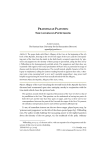
Praestigiae platonis: the cavernous puppetshow
Статья научная
The paper deals with Plato’s Allegory of the Cave at the beginning of the 7th book of the Republic , focusing on the two lowest stages of the Cave (and the corresponding parts of the Line from the simile in the Sixth book), occupied, respectively, by ‘prisoners and puppeteers’; the identity of these groups is questioned, along the lines set by J. Wilberding in his homonymously entitled article. The puppeteers and their show are examined with regard to the lexical peculiarities of Plato’s text, in particular his usage of thauma and the derived thaumatopoios . The overall ironical, playful character of the Allegory is emphasized, calling for cautious reading beyond its apparent face value. A Russian term vertep , meaning both ‘a cave’ and ‘a portable puppetshow’, may prove itself helpful in approaching the sense Plato actually intended with his Allegory.
Бесплатно
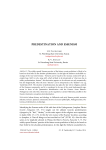
Статья научная
The widely spread Essenes practice of the future events prediction is likely to be based on their belief in the absolute predestination. In this light the hitherto unclarified etymology of the very term Ἐσσαῖοι / Ἐσσηνοί can be traced to the Aramaic notion חשיא (pl. st. emph.)/resp. חשאין (st. abs.; sing. חשא), which is likely to be interpreted as “what man has to suffer, predestination, fortune”; this derivation appears to be relevant not only semantically, but also linguistically. Thus the term “Essenes” can be interpreted as the “fatalists” (see e.g. Tantlevskij 2013). The doctrine of predestination also plays the key role in religious outlook of the Qumran community, and it is considered to be one of the most fundamental arguments in favor of the Qumranites identification with the Essenes. Some Platonic-Pythagorean (not only Stoic) doctrines can be regarded as certain Hellenistic parallels to the Essenic-Qumranic conception of predestination.
Бесплатно
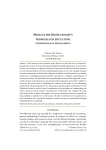
Proclus the neoplatonist's proposals on education: epistemological prolegomena
Статья научная
This historical and systematic study discusses in the form of a reconstructive proposal the system of the general epistemological principles followed by the eclecticist Proclus, who attempts to organize and present questions on Education directly associated with Practical Reason. From the methodological point of view, the example emerged from his commentary on the Platonic dialogues Alcibiades I and Respublica for providing instruction is multidimensional and holistic and aims at a complete transformation of human personality. The foundation for any philosophical and political approach, as constantly stressed, is that human is a special and unique being that can be able to influence decisively the social status. Considering the content of the study, we are discussing, mainly from a historical point of view, the position and the purpose of Education in Late Hellenistic Period, as well as Proclus’ contribution to the disciplines of Anthropology and Ethics, which are closely related to the objectives of Education. We complete the study with some further remarks with regard to the deepest meaning of Proclus’ proposal and the possibility to implement it in these days. The above-mentioned are not presented as final conclusions, but as questions-inquiries, in order to propose an internally developing methodology for investigating.
Бесплатно
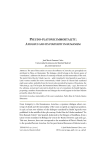
Pseudo-platonic immortality: axiochus and its posterity in humanism
Статья научная
The aim of this article is to trace the influence of Axiochus, an apocryphal text attributed to Plato, on Humanism. The dialogue, which belongs to the literary genre of “consolation”, addresses the theme of contempt of death and the immortality of the soul. The jurist Pedro Díaz de Toledo (1410/15 - 1466) translated it into Spanish in 1444 from a Latin version entitled De morte contemnenda, which Cencio de’ Rustici had translated eight years earlier, probably from the Greek codex provided by Joannes Chrysoloras, the Vaticanus gr. 1031. For his part, the humanist Beatus Rhenanus (1485 - 1547), the owner of five editions, revised and corrected in detail the text of a translation by Rudolf Agricola, proposing a number of amendments and changes that would appear in the Basel edition printed by Adam Petri in 1518.
Бесплатно
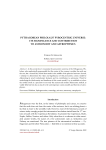
Pythagorean Philolaus pyrocentric universe
Статья научная
In this paper, firstly, the cosmology of the Pythagorean Philolaus is overestimated, insisting that the center of the universe is not the earth and not the sun, but the central fire center, which is located in the center of the spherical cosmos. Secondly, the author demonstrates the value and significance of this model of the firecentric cosmos, revealing its new and revolutionary elements and their contribution to the development of astronomy. Thirdly, emphasizing the universal significance and lasting value of this model, the author shows that it should be considered not only the precursor of the heliocentric model of the cosmos, as is usually done, but also the anticipation of modern cosmological and astrophysical constructions.
Бесплатно
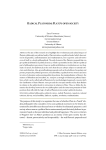
Radical Platonism: Plato's open society
Статья научная
The aim of this research is to highlight the revolutionary and radical impact of Platonic philosophy on political reality. Plato introduces a political model which does not end in dogmatism, authoritarianism and totalitarianism, but is aporetic and subversive even of itself, i.e., deeply philosophical. The only element of the Platonic proposal that can give political definitions is political science, which is personified in the collective political part of philosophers-governors. However, political definitions or institutions are not dogmatic in nature, but dialectical, in the sense that they are always subject to rational criticism and refutation. Also, groundbreaking proposals such as the abolition of nepotism and private property for political governors, social mobility, equality between women and men in terms of education and assuming political positions, the marginalization of slavery, the mixture of liberalism and socialism, etc. compose a strongly revolutionary political manifesto, which can be called radical Platonism.Our methodological approach concerns both the clarification of basic Platonic concepts and the concepts introduced by Alain Badiou in relation to the political and its reinvention in relation to Plato. Thus, we follow the dynamics that develop between the two philosophers and the meta-interpretation of their positions that will yield the logic of radical Platonism into today’s political situation.
Бесплатно
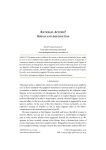
Rational actors? Hippias and Aristogeiton
Статья научная
This paper seeks to address the extent to which ancient historical actors might be seen to have exhibited what might be described as rational motives. In particular, it examines a number of strategic interactions employed by the Athenian tyrant Hippias in his interactions of Aristogeiton, the protagonist of an unsuccessful coup d’etat . A secondary objective of this paper is to explore Hippias’ reactionary policies following his brother’s assassination, namely, whether Hippias’ choice of external allies, in the face of possible exile, were irrational as suggested by some ancient authors.
Бесплатно
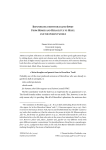
Reinforcing demythologized spirit. From Homer and Heraclitus to Hegel and the present world
Статья научная
Explicit reflections on intellectual faculties and their good applications begin by talking about a divine spirit and a human soul. Heraclitus seems to be the first to explain that all higher mental capacities rest on ethical formation. Self-conscious thinking leads therefore, as Hegel also sees, to normative sociality as its transcendental basis.
Бесплатно
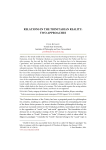
Relations in the Trinitarian reality: two approaches
Статья научная
The Greek model of the Trinity, based on the Theological Orations of Gregory of Nazianzus, treats the Trinitarian relations as connections between the Father and the two other persons: the Son and the Holy Spirit. The two relations have to be heteronymous (“generation” and “procession”), and have to be interpreted from the extreme realistic position. The Latin Trinitarian model, based on Boethius’ De Trinitate, treats relations as three subsistent persons. The relations have to be unidirectional: from the Father to the Son, and from both of them to the Holy Spirit. Both models are adequate and effective, but incompatible. One of the consequences of this incompatibility is the problem of filioque: the introduction of an additional relation of procession into the Greek model as well as the exclusion of this relation from the Latin model result in the inadequacy of the models. From the point of view of the complementability of a model, the Greek model allows introduction of new ele-ments, while the Latin model does not. The soteriological consequences are such that the Greek model welcomes a human person to establish a unique relation with the person of the Father, which leads to the theosis of a creature. The Latin model requires the saving relation to be established with the whole Trinity, and theosis is not supported.
Бесплатно
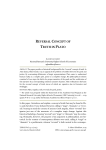
Reversal concept of truth in Plato
Статья научная
The paper provides a historical background for the “reversal” concept of truth. In Attic drama, Plato found a way to approach the problem of conflict between the good and justice. By overcoming deficiencies of tragic representations, Plato came to understand human reality as a complex plot, prone to a complete change. His philosophical solution consisted of two steps: the birth of a proper narrative of the good and the verification of this narrative by a corresponding common narrative of justice. This verification is the basis for the reversal concept of truth, traces of which are operative also in Descartes and Heidegger.
Бесплатно
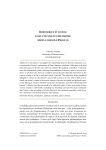
Rh'etorique et justice dans l’oeuvre du philosophe n'eoplatonicien Proclus
Статья научная
In this article, I investigate the relationship between rhetoric and justice as it is presented in Proclus’ commentary of Plato’s dialogue Alcibiades I. The study is divided into three parts. In the first one, which is entitled “The political counsellor”, I elaborate how this institutional person, utilizing the possibilities of rhetoric, aims to exercise prudence to all those who intent to complete personally and politically themselves in the context of justice. In the second part, which is entitled “The refutation of the superficial syllogisms”, I focus on what rhetoric can provide to man so as to be able to think in a rational way when it comes to the precise content of justice as a moral and political virtue. In the third part, which is entitled “The justice and injustice and their relationship with benefit”, I discuss how rhetoric needs to be utilized in order to have new modes of connection of justice with benefit, excluding any beneficial criterion. The main conclusion that I draw is that according to Proclus rhetoric is for a political counsellor a tool of justice, which has to be the final purpose of his mission.
Бесплатно
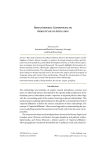
Roman Imperial Commonwealth: Iberian Case of Affiliation
Статья научная
This study examines the political relations between the Roman Empire and the Kingdom of Iberia (Eastern Georgia). It explores the Roman Empire's policies and attitudes toward its peripheries, particularly the Kingdom of Iberia, as well as Iberia's aspirations to integrate into the imperial framework. The research highlights the formation of a Roman imperial network, reflecting the alignment of interests and interactions between these two political entities. The relationship between the Roman Empire and Iberia is analysed using two Roman imperial sources: Res Gestae Divi Augusti and the inscription of Vespasian, along with Caesars Titus and Domitian. Through the interpretation of these materials, the study aims to model the dynamics of this relationship.
Бесплатно
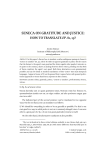
Seneca on gratitude and justice: how to translate Ep. 81, 19?
Статья научная
In this paper I discuss how to translate a rather ambiguous passage in Seneca’s “Letters to Lucilius” (81, 19), where he either I) opposes gratitude to justice for the reason that the former is the agent’s own good and the latter regards other people’s interests or, II) quite to the contrary, draws an analogy between these virtues, pointing out that both of them constitute the agent’s own good. Both these alternatives seem grammaticaly possible and can be found in modern translations of this “Letter” into main European languages. I argue in favour of II) on the ground that it agrees better with general perfectionist approach to virtues that Seneca espouses in this context.
Бесплатно
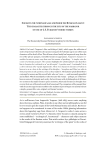
Статья научная
In Ivan S. Turgenev’s Khor and Kalinych (1846), which opens the collection of stories A Sportsman’s Sketches, the narrator compares the Athenian sage to one of the main characters of the sketch, Khor. This old man, whose family has long moved away from the rest of the private peasants, resembles Socrates in appearance. Turgenev’s character resembles Socrates in more ways than one: his manner of speaking – “a simple, wise discourse of a Russian peasant”. The narrator highlights his “philosophical” traits that liken him to Socrates: he is referred to as “an old sceptic”, “a positive man”, “a rationalist”; he is a clever old man who “speaks ingeniously”. These two characters (Socrates of Athens is known to us as a hero in the writings of his disciples – Xenophon and Plato) are akin in their propensity to ask questions, ironic as they might be. The narrator speaks about Khor’s contempt for women and his own old wife, who was “cross, ... and incessantly grumbled and scolded”. Which immediately evokes Socrates’ old woman – perhaps, one of the best-known women of Antiquity and, surely, the best-known wife of philosophers of all times. It is crossness that made Socrates’ spouse notorious. Khor and Socrates are brought close even in their care of themselves and their homestead. The comparison of the peasant Khor with the ancient sage Socrates testifies to the tradition of perceiving in our national culture a simple, peasant-like, wise, original, our Russian Socrates.
Бесплатно
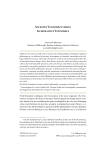
Socrates’ economics versus Ischomachus’ economics
Статья научная
The present study seeks to deepen the understanding of Xenophon’s political philosophy as it is reflected in Socrates’ investigation of economic knowledge in the dialogue titled Oeconomicus. The study concentrates on the six conventional parts of the oikos or household (house, things, slaves, land, horses, and wife), which are loosely connected with six facets of human life (pleasure, order, rule, leisure, enrichment, and education), as presented by the perfect gentleman (rich and successful) Ischomachus and his pupil, the (poor and wretched) philosopher Socrates. It demonstrates how the latter, learning Ischomachus’ economic teaching, radically transforms it, simultaneously showing the most serious possibilities lying behind the common notions of economic and political life and the inherent limitations of their fulfillment and threatening to undermine (and, indeed, undermining, in the personal case of Socrates) said ways of life as they are conventionally perceived.
Бесплатно

